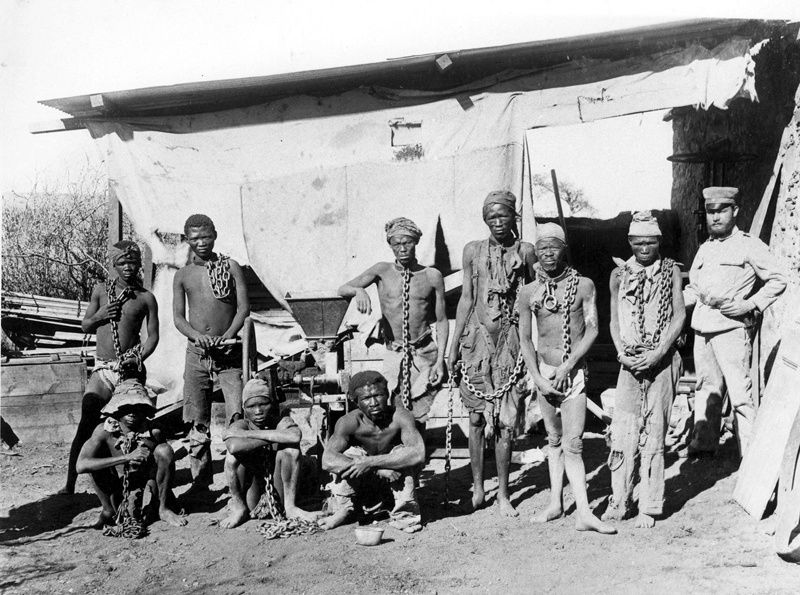 WINDHOEK, Namibia: This undated file photo taken during the 1904-1908 war of Germany against Herero and Nama in Namibia shows a soldier (right) probably belonging to the German troops supervising Namibian war prisoners. - AFP
WINDHOEK, Namibia: This undated file photo taken during the 1904-1908 war of Germany against Herero and Nama in Namibia shows a soldier (right) probably belonging to the German troops supervising Namibian war prisoners. - AFPBERLIN: Germany on Friday acknowledged it had committed genocide in colonial-era Namibia and promised a billion euros in financial support to descendants of the victims, a move Windhoek welcomed as a "first step" but which activists described as insufficient. "We will now officially refer to these events as what they are from today's perspective: genocide," said Foreign Minister Heiko Maas. "In light of the historical and moral responsibility of Germany, we will ask forgiveness from Namibia and the victims' descendants" for the "atrocities" committed, he added.
The announcement came after more than five years of negotiations between the two countries over events in the territory held by Berlin from 1884 to 1915. German colonial settlers killed tens of thousands of indigenous Herero and Nama people in 1904-1908 massacres-labeled by historians as the first genocide of the 20th century. The atrocities have poisoned relations between Namibia and Germany for decades.
'Doomed to fail'
In a "gesture to recognize the immense suffering inflicted on the victims", Germany will support the "reconstruction and the development" of Namibia via a financial program of 1.1 billion euros ($1.34 billion), Maas said. The sum will be paid over 30 years, according to sources close to the negotiations, and must primarily benefit the descendants of the Herero and Nama. Yet Maas stopped short of referring to reparations, saying the payment did not open the way to any "legal request for compensation".
Namibian President Hage Geingob's spokesman Alfredo Hengari told AFP an official recognition of genocide was "the first step in the right direction". "It is the basis for the second step, which is an apology, to be followed by reparations," he added. The agreement still has to be approved by the two countries' parliaments. But activist groups in both countries have already criticized it for the lack of direct reparations. The Germany-based initiative "Berlin Postkolonial" said the deal was "doomed to fail" and "not worth the paper it is written on".
The group, which organized a protest attended by around 50 people in the German capital on Friday, said the Herero and Nama communities had not been consulted enough during the negotiations. In Namibia, a Herero leader accused the government of being strong-armed into the accord. "We will not accept any outcome between these two governments," Mutjinde Katjiua, secretary general of the Ovaherero Traditional Authority, told AFP. About a hundred activists protested against the agreement in front of parliament and the German ambassador.
Rebellion, reprisals
Namibia was called German South West Africa during Berlin's rule, then fell under South African sway for 75 years, before finally gaining independence in 1990. Tensions boiled over in 1904 when the Herero-deprived of their livestock and land-rose up, followed shortly after by the Nama, in an insurrection that was crushed by German imperial troops. In the Battle of Waterberg in August 1904, around 80,000 Herero, including women and children, fled and were pursued by German troops across what is now known as the Kalahari Desert. Only 15,000 survived.
German General Lothar von Trotha, sent to put down the rebellion, ordered the peoples' extermination. At least 60,000 Herero and around 10,000 Nama were killed between 1904 and 1908. Colonial soldiers carried out mass executions and forced men, women and children to flee to the desert where thousands died of thirst. They also established infamous concentration camps, such as the one on Shark Island.
The legacy of those atrocities have long overshadowed relations between Berlin and Windhoek. Negotiations over an apology began in 2015, and when in 2018 Germany returned the bones of members of the Herero and Nama tribes, the minister for international cultural policy Michelle Muentefering asked for "forgiveness from the bottom of my heart". President Geingob rejected an agreement last year. Berlin, he said, had refused to accept the word "reparations", as that word was also avoided during the country's negotiations with Israel after the Holocaust. - AFP










